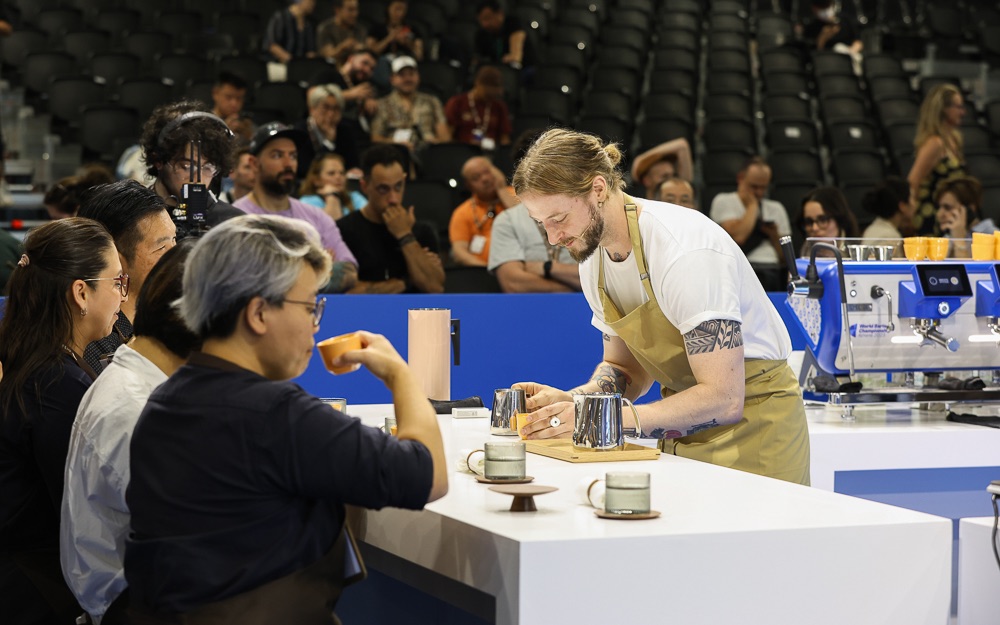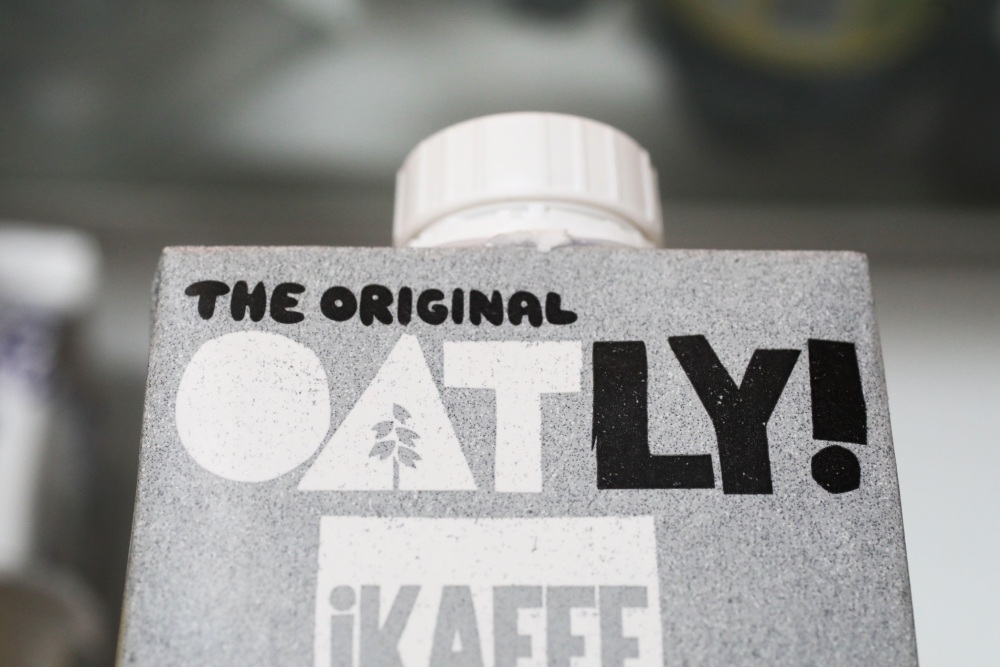Why didn’t more people use plant milks at the 2023 World Barista Championship?

When the Specialty Coffee Association announced the new rules and regulations for the 2023 World Barista Championship, there were some notable changes that were sure to shake up the competition. The biggest update by far was that competitors were now allowed to use plant milks – a rule that many in the industry thought had been a long time coming.
“These updates mark the largest competition changes since before the pandemic, opening up new service possibilities for competitors,” the organisation said in a statement – acknowledging the significance of broadening the types of milk available at the competition.
Following this, many people expected to see a good number of competitors using plant-based milks at the 2023 World Barista Championship. But in reality, only one person – Danish competitor Patrik Rolf – chose to do so. And even then, he only used a blend which contained both dairy and plant milks.
So, it seems important to ask – was it too early for plant milks at the WBC? And will see more competitors use them in the future? Read on to find out.
You may also like our article on the new plant milk rule at the World Barista Championship.
Who used plant milk at this year’s competition?
From 21 to 24 June, the 2023 World Barista Championship took place at World of Coffee Athens. Six competitors made it to the finals, with Boram Um taking the top spot – the first Brazilian competitor to ever win the WBC.
Alongside Brazil’s historic win, this year’s competition also saw another first: the use of commercially-available plant milks.
Prior to the new rule on using plant milks, the 2022 World Barista Championship Official Rules and Regulations stated that:
“A milk beverage is a combination of 1 single shot of espresso (per the definition of espresso in the ‘Espresso’ section) and steamed cow’s milk.”
This meant national and World Barista Championship competitors had to use cow’s milk in the milk beverage course – or risk receiving zero points in the category.
Given how immensely popular plant milks (especially oat milk) are in specialty coffee shops around the world, many expected to see them being used on the WBC stage this year.
Instead, only Patrik Rolf, the founder of April Coffee Roasters in Copenhagen, used a plant-based milk for his milk beverage course in the finals.
And furthermore, Patrik (who placed sixth) didn’t exclusively use plant milk. During his routine, he explained he created a blend of 90% cow’s milk and 10% coconut milk which complemented the tropical flavour notes in his coffee – a Red Gesha from Finca La Negrita in Colombia.
“For me, competing is a platform to try new things,” Patrik tells me. “I didn’t plan to use a plant-based milk before arriving in Athens, but we started experimenting with them during practice.
“Coconut milk paired well with my espresso, mainly because of the coffee’s tropical flavour notes,” he adds. “It wouldn’t have worked well with another coffee, but the blend [of coconut and cow’s milk] was better than the individual ingredients.”
Oat milk at national barista championships
Although the new rule allowing plant milks only came into effect at this year’s competition, Patrik’s routine is not the first time we’ve seen non-dairy milks used at barista championships.
At previous national competitions, a small number of baristas have openly defied the cow’s milk rule:
In 2019, Cristian Tellez used Minor Figures oat milk during his Canadian Barista Championship routine – effectively disqualifying him
In October last year, 2023 German Barista Championship competitor Mikolaj Pociecha also used oat milk for his milk beverage course
Following both competitors’ routines, but especially Pociecha’s, there was significant pushback against the plant milk ban from the wider coffee community. In September 2022, Oatly even published an open letter to the SCA asking them to revoke the cow’s milk rule at the WBC.
Why did this happen?
For many, it’s unexpected that so few competitors used plant milks at the 2023 World Barista Championships. Around the world, plant-based milks – particularly oat milk – have become immensely popular in coffee shops.
In 2022, sales of refrigerated oat milk increased by 37% to US $512 million – evidence that the market continues to grow year-on-year. Some specialty coffee shops, in fact, claim that oat milk is ordered just as much as cow’s milk at some of their locations.
So why did no one use oat milk at this year’s WBC?
Well, there could be several reasons. First and foremost, it’s only fair to say that cow’s milk does perform better than any other type of milk when steamed and used to pour latte art. Moreover, the natural creaminess, richness, and sweetness of dairy often lends itself to enhancing beverage quality.
Although oat milk is fairly neutral-tasting, some non-dairy milks often have more distinctive flavours – notably coconut and soy. According to Patrik, this could lead to a lower score.
“Regarding taste, the challenge with plant milks is the intensity of flavours which come from the milk,” he says. “Traditionally, a milk beverage would score lower if the judges could ‘taste the milk’ – that’s why we didn’t see many plant milks at this year’s competition.”
Foreseeing change in the future
Patrik believes that plant milks will become more popular at future World Barista Championships in the future.
“It usually takes one or two seasons before competitors start getting more used to new rules,” he explains.
As part of the new rules and regulations for the WBC, there are some changes to how judges assess and score certain aspects of a competitor’s routine. Some of these include:
When it comes to presentation, judges are now looking for originality in concept, methods, techniques, and ingredients
The total impression score has been broadened somewhat, and includes several prompt questions such as:
Did the performance inspire a deeper connection to coffee?
Was the experience immersive, thought-provoking, or otherwise important to specialty coffee?
Would this barista have inspired me about specialty coffee?
Given that the concept of a competitor’s routine is now more important to overall scores, we could see more baristas focus on topics which are a more natural fit for plant milks – such as environmental sustainability, for instance.
Moreover, earlier in the year, the SCA announced Alpro as the first-ever qualified Plant-Based Beverage Sponsor for the World Barista Championship. This is sure to have some influence over the competition, too.
We’re still yet to see the full impact of the new plant milk rule at the World Barista Championship. However, considering the competition is a global platform for innovation, it would be surprising if we didn’t see more plant milks used at the WBC over the next few years.
“We’ll see much more of [plant milks at the WBC] in the future,” Patrik says. “And it’s a step in the right direction.”
Enjoyed this? Then read our article on what happened at the 2023 World Barista Championship.
Photo credits: Specialty Coffee Association
Perfect Daily Grind
Want to read more articles like this? Sign up for our newsletter!
The post Why didn’t more people use plant milks at the 2023 World Barista Championship? appeared first on Perfect Daily Grind.





Responses